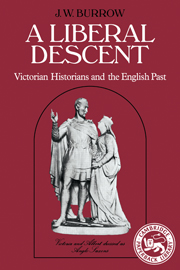Book contents
Summary
Nineteenth-century historians occasionally protested against one of the constraints of their art: its sequential arrangement. In history events might be simultaneous which, in narrative, become extended. Carlyle pointed this out, echoed, as so often, by Froude. It is a caution worth bearing in mind in any retrospective consideration of the themes of the present book. The reader, judging subjectively, may legitimately feel that the road from Macaulay to Froude has been a long and weary one. But this is an illusion, as well as perhaps a failure, of art. The first volumes of Froude's History appeared only four months after the publication of Macaulay's last, in December 1855. It is quite proper, with no more than the usual caveats, to speak of a Whig historiographical tradition, from Rapin in the early eighteenth century to Hallam and Macaulay, Stubbs, Freeman and Green. But the authors considered in this book, even those who, unlike Froude, can without apology be called Whig historians, do not necessarily represent evenly spaced moments in that tradition. It is only with this reservation, as well as with as full a recollection as possible of each author's idiosyncrasies, that we can begin to consider in what sense if any the sequential arrangement of this book may correspond to any kind of cultural story.
There are, of course, some obvious connections. The example of Macaulay's History exerted a marked influence on the ways Freeman certainly, and probably Froude too, for all his antagonism to Macaulay, undertook their own tasks, and this helps to give the work of all three a certain homogeneous character.
Information
- Type
- Chapter
- Information
- A Liberal DescentVictorian historians and the English past, pp. 286 - 301Publisher: Cambridge University PressPrint publication year: 1981
